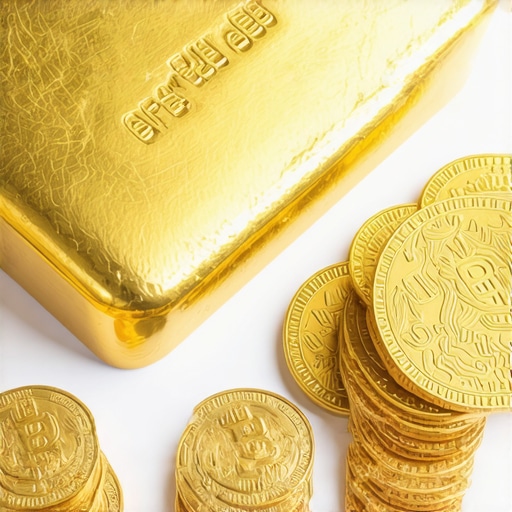My First Dive into Buying Physical Gold and the Trust Challenge
I still remember the thrill and anxiety the first time I decided to purchase physical gold. The idea of holding something so tangible and valuable was exciting, yet the overwhelming question lingered: how do I ensure the gold dealer I’m buying from is trustworthy? Having learned a few hard lessons initially, I want to share my personal insights on how to identify trusted gold dealers for safe physical buys.
Why Trust Matters More Than Ever in Physical Gold Purchases
Unlike digital assets or stocks, physical gold requires you to place your faith in the dealer’s authenticity and integrity. I’ve come to realize that a reputable dealer is not just about competitive prices but also about transparency, certification, and a solid track record. When I first ventured into this world, I was cautious about dealers who lacked verifiable credentials or had vague buying policies.
How can you spot a gold dealer you can truly rely on?
From my experience, there are several practical steps you can take. First, look for dealers who provide transparent pricing linked to the current market rates. I always double-check prices against trusted sources to avoid inflated premiums. Second, ensure the dealer offers certified gold products with proper documentation like assay certificates or hallmarking. This was a game-changer for me because it guaranteed authenticity.
Third, check reviews and testimonials from other buyers, preferably on independent platforms. I found that dealers who are active in reputable industry associations or regulated by financial authorities tend to have better accountability. For example, some dealers list their affiliations with organizations like the Professional Numismatists Guild or the Better Business Bureau, which helped me gain confidence.
Learning from Trusted Resources to Navigate the Gold Market
To deepen my understanding, I regularly consult authoritative sources such as the Kitco News and market analyses that shed light on gold price trends and dealer reputations. These resources not only keep me informed about market fluctuations but also help me evaluate whether a dealer’s pricing and practices align with industry standards.
Personal Tips to Avoid Common Pitfalls When Buying Physical Gold
One mistake I made early on was rushing into a purchase without verifying the dealer’s buy-back policy. Trusted dealers usually offer clear, fair, and documented buy-back options, which is crucial for liquidity. I recommend asking for these details upfront and getting everything in writing.
Also, never hesitate to ask questions about the source of the gold. Ethical sourcing is becoming increasingly important, and I always prefer dealers who are transparent about their supply chain.
Why I Believe Safe Physical Gold Buys Start with the Right Dealer
Buying physical gold is as much about peace of mind as it is about investment. When you find a dealer who values transparency, certification, and customer trust, you’re not just buying gold—you’re securing a reliable relationship for future trades and advice. For beginners like me, resources such as this guide on identifying reputable gold dealers have been invaluable in navigating the complex market safely.
If you’ve had experiences buying physical gold or tips on spotting trustworthy dealers, I’d love to hear your stories in the comments below. Sharing our collective wisdom can help all of us make smarter, safer investments.
Deepening Your Due Diligence: Beyond the Basics of Gold Dealer Trust
Once you understand the fundamentals of identifying trustworthy gold dealers, the next step involves a more nuanced evaluation of their business practices and market reputation. For instance, some dealers actively publish transparency reports detailing their inventory sources and pricing models. I found that engaging directly with dealer representatives and asking about their compliance with anti-money laundering regulations can reveal a lot about their professionalism and reliability.
Another layer to consider is the dealer’s responsiveness and customer service quality. In my experience, dealers who promptly answer detailed questions and provide comprehensive buying guides are much more likely to foster long-term trust. This aspect is crucial especially when navigating complex purchases such as rare coins or large gold bars, where the stakes and premiums differ significantly.
Leveraging Industry Certifications and Associations as Trust Signals
Certifications from recognized bodies are more than just badges; they represent adherence to rigorous standards. Organizations like the London Bullion Market Association (LBMA) and the Professional Numismatists Guild (PNG) offer certifications that signify quality and ethical sourcing. When I began prioritizing dealers affiliated with these associations, I noticed a significant reduction in purchase-related anxiety.
Moreover, verified dealer listings on platforms endorsed by these associations provide reassurance against fraud. If a dealer is unwilling or unable to prove such affiliations, it’s a strong signal to proceed with caution or look elsewhere. This aligns with best practices recommended in the gold investment community, as outlined in detailed guides such as this authoritative resource.
What advanced verification techniques can seasoned investors use to vet gold dealers beyond surface-level checks?
Experienced investors often use forensic verification methods such as independent assay testing of purchased gold, comparing dealer invoices with spot price histories, and verifying serial numbers on bullion products. Additionally, monitoring dealer behavior over time through community forums and market feedback can uncover patterns not immediately obvious. These strategies help mitigate risks of counterfeit or misrepresented products, ensuring your investment’s integrity.
For example, I have personally used third-party assay services to confirm the purity of gold bars from new dealers, which has saved me from potential losses. These practices, though more time-consuming, bolster confidence and protect capital, especially in volatile markets.
Understanding the importance of these verification steps can be critical, as discussed in recent analyses by the Kitco News, which emphasize the growing sophistication of counterfeit operations and the need for vigilance.
Practical Tips for Secure Physical Gold Purchases
When finalizing a purchase, always insist on detailed receipts and secure shipping methods. Trusted dealers use insured courier services with tracking to ensure delivery integrity. Avoid cash-only transactions or untraceable payment methods, as these can complicate disputes or claims.
Also, consider storing your physical gold in reputable vault facilities or safety deposit boxes instead of at home, to reduce risks of theft or damage. Many dealers offer storage solutions or partnerships with secure vault providers, which can be an added layer of security.
For more insights on these storage and security best practices, check out our expert guide on safely storing physical gold. Taking these precautions not only protects your assets but also ensures liquidity and peace of mind.
If you found these insights helpful or have additional strategies for vetting gold dealers, please share your thoughts in the comments below. Your experiences can help others navigate this complex market with greater confidence.
When Trust Transcends Transactions: Building a Relationship with Your Gold Dealer
Over time, I realized that my relationship with a gold dealer isn’t just transactional—it’s foundational to my confidence in the entire investment. This awareness dawned on me after a few purchases where the dealer’s willingness to educate and support me through the process made a world of difference. Trust, in this sense, evolves from consistent experiences, transparency, and genuine care rather than a single certified document or price quote.
For example, some dealers go beyond the sale by providing market insights, updates on supply-demand dynamics, or even guidance on when to consider selling. This ongoing dialogue helped me see gold not just as a static asset but as part of a living market with ebbs and flows. If you want to explore how these market forces play out, I’ve found this detailed look at gold supply and demand to be incredibly illuminating.
How Do You Gauge a Dealer’s Integrity Beyond Certifications and Reviews?
What subtle signals have you noticed that reveal a dealer’s true reliability?
From my experience, the more nuanced indicators often speak louder than formal credentials. Does the dealer welcome your questions without hesitation? Are they forthcoming about potential risks or market uncertainties? I recall one dealer who openly discussed the possibility of premium fluctuations and advised me on timing purchases accordingly. That level of honesty and transparency made me feel valued rather than just another sale.
Another subtle yet telling factor is how dealers handle challenges or disputes. I once encountered a minor issue with a delayed shipment. The dealer’s proactive communication, prompt resolution, and willingness to offer a small goodwill gesture not only resolved the matter but deepened my trust. Such experiences, while less tangible than certifications, are invaluable.
Reflecting on the Role of Industry Trends and Regulatory Changes in Dealer Trustworthiness
Last year, I followed regulatory updates and industry trends closely, realizing they can significantly impact dealer practices. Dealers who adapt to new compliance standards and maintain transparent reporting often signal a commitment to ethical operations. For instance, anti-money laundering (AML) regulations in many countries now require dealers to verify sources and maintain detailed transaction records. A dealer who openly shares their compliance approach assures me they prioritize integrity.
Moreover, global economic shifts—such as central banks increasing gold reserves—can influence dealer inventories and pricing strategies. Following how central bank purchases affect gold prices has helped me understand the broader context dealers operate in, which in turn informs my expectations and trust assessments.
Personal Strategies for Vetting Dealers in a Rapidly Changing Market
In today’s fast-evolving market, I’ve adopted a multi-layered approach to vetting dealers. Beyond checking credentials and reviews, I monitor dealer pricing trends relative to spot prices over time to spot inconsistencies. I also engage with community forums where seasoned investors share real-world experiences and warning signs about certain dealers. These conversations often reveal insights that formal channels miss.
If you’re curious about more advanced strategies for securing your physical gold purchases, I highly recommend exploring this comprehensive guide on avoiding fraud and loss. It complements the practical wisdom I’ve gained and helped me refine my approach.
The Subtle Art of Patience: Why Timing Matters in Trust and Purchase Decisions
One of the toughest lessons I learned is that patience is a critical element in building trust and making sound purchases. Rushing into deals because of market hype or fear of missing out often led to second-guessing and avoidable mistakes. Taking the time to research, communicate, and even walk away when something felt off helped me avoid pitfalls.
Trustworthy dealers understand this dynamic and don’t pressure buyers into quick decisions. They provide space for reflection and encourage buyers to gather information. This patience breeds a healthier, more sustainable relationship.
Have you experienced moments where patience or a dealer’s approach to timing influenced your buying decisions? I’d love to hear your stories or questions. Sharing these experiences deepens our collective understanding and supports smarter, safer gold investments for all.
Decoding Dealer Transparency Through Regulatory Compliance and Ethical Standards
In my journey beyond the initial steps of identifying trustworthy dealers, I’ve come to appreciate the profound role that regulatory compliance and ethical standards play in cementing dealer credibility. It’s not just about certifications or associations but understanding how dealers integrate anti-money laundering (AML) and know-your-customer (KYC) protocols into their daily operations. A dealer’s openness about such compliance measures often signals a robust commitment to transparency that goes beyond legal obligation—it reflects a respect for the investor’s security and the health of the market ecosystem itself.
For example, I recall a dealer who proactively shared their AML policy and transaction monitoring systems when I inquired, which instantly elevated my confidence. This level of disclosure, while sometimes overlooked, is a vital trust pillar especially in an era where regulatory scrutiny intensifies globally.
Market Intelligence as a Trust Multiplier: Leveraging Supply-Demand Nuances
Trust in a dealer also intertwines with their demonstrated market intelligence. I found that dealers who articulate the intricate dynamics of gold supply and demand, including geopolitical influences and central bank behaviors, provide buyers with a richer context for their purchases. Engaging with such dealers feels more like a partnership than a mere transaction.
This insight has deepened my appreciation for resources like this comprehensive analysis of gold supply and demand, which demystifies how these forces shape price movements. Dealers who echo and build upon these insights tend to be more reliable because they align their pricing and inventory strategies with real-world market conditions rather than opportunistic speculation.
How Can Advanced Investors Integrate Dealer Trust Assessment with Market Timing Strategies?
Advanced investors often face the challenge of synchronizing trust vetting with optimal market timing. From my experience, this involves continuously cross-referencing dealer transparency metrics with macroeconomic indicators such as interest rate trends, inflation data, and central bank gold buying activity. For instance, tracking reports on central bank purchases—like those detailed in this authoritative resource—can help anticipate inventory shifts and pricing adjustments among dealers.
Moreover, seasoned investors frequently engage in peer networks and forums where dealer behaviors and market timing insights converge, revealing subtle cues that formal channels might miss. This layered approach not only mitigates risk but also enhances the ability to capitalize on market windows with trusted partners.
Navigating the Emotional Landscape: Building Long-Term Dealer Relationships for Strategic Growth
What’s often underappreciated in dealer selection is the emotional and psychological dimension. Over years of interaction, I’ve noticed that dealers who foster genuine dialogue, demonstrate empathy in addressing concerns, and share strategic advice cultivate enduring trust that goes beyond transactional convenience. This relational depth transforms gold buying into a strategic endeavor anchored in mutual respect.
Such relationships have enabled me to access exclusive offerings, early alerts on market shifts, and bespoke investment strategies—advantages that are elusive in purely transactional settings. It’s a reminder that in the gold market, trust is a living, evolving asset as valuable as the metal itself.
If you’re eager to delve deeper into sophisticated gold investment strategies and dealer evaluations, I invite you to explore this advanced guide on maximizing gold investment returns. Feel free to share your nuanced experiences or questions in the comments—collective wisdom is our strongest ally in mastering this complex market.
Things I Wish I Knew Earlier (or You Might Find Surprising)
Trust Is a Journey, Not a Checklist
When I first started buying physical gold, I thought ticking off certifications and reading reviews was enough. Over time, I realized trust builds through ongoing interactions and shared transparency. It’s like getting to know a person — consistency, openness, and responsiveness matter far more than a one-time document.
Patience Pays More Than Price Haggling
I used to rush to buy gold when prices seemed low, but dealers who encouraged me to take my time and ask questions ended up being the most reliable. A dealer who respects your pace often signals long-term integrity instead of quick salesmanship.
Documentation Is Your Best Friend
Early on, I underestimated how crucial detailed receipts, assay certificates, and clear buy-back policies are. These documents protect you not only from fraud but also ensure smooth resale or dispute resolution. Always insist on them, even if the dealer seems trustworthy.
Customer Service Reflects Dealer Values
One subtle but vital lesson was noticing how dealers handle the small things — like answering questions thoroughly or resolving shipping delays. A dealer’s willingness to communicate openly often hints at their overall reliability and respect for customers.
Market Knowledge Enhances Trust
I found that dealers who share insights about gold supply and demand, or explain how central bank purchases influence prices, provide a richer buying experience. Their market intelligence reassures me that they price fairly and aren’t just opportunistically inflating premiums.
Resources I’ve Come to Trust Over Time
Kitco News: This platform is my go-to for up-to-date market analyses and trusted gold price data. It helped me understand dealer pricing and spot suspicious premiums early on.
This guide on identifying reputable gold dealers (read here) has been invaluable. It breaks down practical steps to vet dealers and avoid common pitfalls, making it perfect for beginners and experienced buyers alike.
Buying Gold Now’s insights on gold supply and demand (check it out) gave me a deeper understanding of market forces that influence dealer inventories and pricing strategies.
Safe physical gold investments guide (a must-read) offers advanced tips about avoiding fraud and securing your assets, which helped me refine my approach to buying and storing gold.
Advanced gold investment strategies (recommended for seasoned investors) opened my eyes to how deep dealer relationships and market timing can multiply returns.
Parting Thoughts from My Perspective
Buying physical gold safely starts with choosing the right dealer — someone who values transparency, certification, and genuine customer care. From my journey, I’ve learned that trust isn’t built overnight; it grows through patience, asking the right questions, and engaging with dealers who share both market knowledge and ethical practices.
Physical gold investment is as much about securing peace of mind as it is about financial gain. When you find a trusted dealer, you gain a partner who not only sells gold but also supports your path to smarter, safer investing.
If you’ve had experiences buying physical gold or tips on spotting trustworthy dealers, I’d love to hear your stories in the comments below. Sharing our collective wisdom can help all of us make smarter, safer investments.










